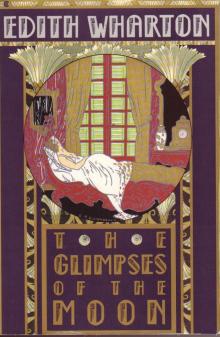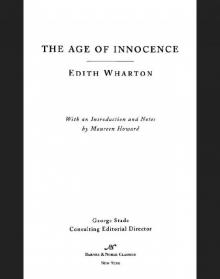- Home
- Edith Wharton
The Touchstone Page 2
The Touchstone Read online
Page 2
Genius is of small use to a woman who does not know how to do her hair. The fame that came to Mrs. Aubyn with her second book left Glennard’s imagination untouched, or had at most the negative effect of removing her still farther from the circle of his contracting sympathies. We are all the sport of time; and fate had so perversely ordered the chronology of Margaret Aubyn’s romance that when her husband died Glennard felt as though he had lost a friend.
It was not in his nature to be needlessly unkind; and though he was in the impregnable position of the man who has given a woman no more definable claim on him than that of letting her fancy that he loves her, he would not for the world have accentuated his advantage by any betrayal of indifference. During the first year of her widowhood their friendship dragged on with halting renewals of sentiment, becoming more and more a banquet of empty dishes from which the covers were never removed; then Glennard went to New York to live and exchanged the faded pleasures of intercourse for the comparative novelty of correspondence. Her letters, oddly enough, seemed at first to bring her nearer than her presence. She had adopted, and she successfully maintained, a note as affectionately impersonal as his own; she wrote ardently of her work, she questioned him about his, she even bantered him on the inevitable pretty girl who was certain before long to divert the current of his confidences. To Glennard, who was almost a stranger in New York, the sight of Mrs. Aubyn’s writing was like a voice of reassurance in surroundings as yet insufficiently aware of him. His vanity found a retrospective enjoyment in the sentiment his heart had rejected, and this factitious emotion drove him once or twice to Hillbridge, whence, after scenes of evasive tenderness, he returned dissatisfied with himself and her. As he made room for himself in New York and peopled the space he had cleared with the sympathies at the disposal of agreeable and self-confident young men, it seemed to him natural to infer that Mrs. Aubyn had refurnished in the same manner the void he was not unwilling his departure should have left. But in the dissolution of sentimental partnerships it is seldom that both associates are able to withdraw their funds at the same time; and Glennard gradually learned that he stood for the venture on which Mrs. Aubyn had irretrievably staked her all. It was not the kind of figure he cared to cut. He had no fancy for leaving havoc in his wake and would have preferred to sow a quick growth of oblivion in the spaces wasted by his unconsidered inroads; but if he supplied the seed it was clearly Mrs. Aubyn’s business to see to the raising of the crop. Her attitude seemed indeed to throw his own reasonableness into distincter relief: so that they might have stood for thrift and improvidence in an allegory of the affections.
It was not that Mrs. Aubyn permitted herself to be a pensioner on his bounty. He knew she had no wish to keep herself alive on the small change of sentiment; she simply fed on her own funded passion, and the luxuries it allowed her made him, even then, dimly aware that she had the secret of an inexhaustible alchemy.
Their relations remained thus negatively tender till she suddenly wrote him of her decision to go abroad to live. Her father had died, she had no near ties in Hillbridge, and London offered more scope than New York to her expanding personality. She was already famous and her laurels were yet unharvested.
For a moment the news roused Glennard to a jealous sense of lost opportunities. He wanted, at any rate, to reassert his power before she made the final effort of escape. They had not met for over a year, but of course he could not let her sail without seeing her. She came to New York the day before her departure, and they spent its last hours together. Glennard had planned no course of action—he simply meant to let himself drift. They both drifted, for a long time, down the languid current of reminiscence; she seemed to sit passive, letting him push his way back through the overgrown channels of the past. At length she reminded him that they must bring their explorations to an end. He rose to leave, and stood looking at her with the same uncertainty in his heart. He was tired of her already—he was always tired of her—yet he was not sure that he wanted her to go.
“I may never see you again,” he said, as though confidently appealing to her compassion.
Her look enveloped him. “And I shall see you always—always!”
“Why go then—?” escaped him.
“To be nearer you,” she answered; and the words dismissed him like a closing door.
The door was never to reopen; but through its narrow crack Glennard, as the years went on, became more and more conscious of an inextinguishable light directing its small ray toward the past which consumed so little of his own commemorative oil. The reproach was taken from this thought by Mrs. Aubyn’s gradual translation into terms of universality. In becoming a personage she so naturally ceased to be a person that Glennard could almost look back to his explorations of her spirit as on a visit to some famous shrine, immortalized, but in a sense desecrated, by popular veneration.
Her letters, from London, continued to come with the same tender punctuality; but the altered conditions of her life, the vistas of new relationships disclosed by every phrase, made her communications as impersonal as a piece of journalism. It was as though the state, the world, indeed, had taken her off his hands, assuming the maintenance of a temperament that had long exhausted his slender store of reciprocity.
In the retrospective light shed by the letters he was blinded to their specific meaning. He was not a man who concerned himself with literature, and they had been to him, at first, simply the extension of her brilliant talk, later the dreaded vehicle of a tragic importunity. He knew, of course, that they were wonderful; that, unlike the authors who give their essence to the public and keep only a dry rind for their friends, Mrs. Aubyn had stored of her rarest vintage for this hidden sacrament of tenderness. Sometimes, indeed, he had been oppressed, humiliated almost, by the multiplicity of her allusions, the wide scope of her interests, her persistence in forcing her superabundance of thought and emotion into the shallow receptacle of his sympathy; but he had never thought of the letters objectively, as the production of a distinguished woman; had never measured the literary significance of her oppressive prodigality. He was almost frightened now at the wealth in his hands; the obligation of her love had never weighed on him like this gift of her imagination: it was as though he had accepted from her something to which even a reciprocal tenderness could not have justified his claim.
He sat a long time staring at the scattered pages on his desk; and in the sudden realization of what they meant he could almost fancy some alchemistic process changing them to gold as he stared. He had the sense of not being alone in the room, of the presence of another self observing from without the stirring of subconscious impulses that sent flushes of humiliation to his forehead. At length he stood up, and with the gesture of a man who wishes to give outward expression to his purpose—to establish, as it were, a moral alibi—swept the letters into a heap and carried them toward the grate. But it would have taken too long to burn all the packets. He turned back to the table and one by one fitted the pages into their envelopes; then he tied up the letters and put them back into the locked drawer.
III
It was one of the laws of Glennard’s intercourse with Miss Trent that he always went to see her the day after he had resolved to give her up. There was a special charm about the moments thus snatched from the jaws of renunciation; and his sense of their significance was on this occasion so keen that he hardly noticed the added gravity of her welcome.
His feeling for her had become so vital a part of him that her nearness had the quality of imperceptibly readjusting his point of view, so that the jumbled phenomena of experience fell at once into a rational perspective. In this redistribution of values the sombre retrospect of the previous evening shrank to a mere cloud on the edge of consciousness. Perhaps the only service an unloved woman can render the man she loves is to enhance and prolong his illusions about her rival. It was the fate of Margaret Aubyn’s memory to serve as a foil to Miss Trent’s presence, and never had the poor lady thrown her successor into
more vivid relief.
Miss Trent had the charm of still waters that are felt to be renewed by rapid currents. Her attention spread a tranquil surface to the demonstrations of others, and it was only in days of storm that one felt the pressure of the tides. This inscrutable composure was perhaps her chief grace in Glennard’s eyes. Reserve, in some natures, implies merely the locking of empty rooms or the dissimulation of awkward encumbrances; but Miss Trent’s reticence was to Glennard like the closed door to the sanctuary, and his certainty of divining the hidden treasure made him content to remain outside in the happy expectancy of the neophyte.
“You didn’t come to the opera last night,” she began, in the tone that seemed always rather to record a fact than to offer a reflection on it.
He answered with a discouraged gesture. “What was the use? We couldn’t have talked.”
“Not as well as here,” she assented; adding, after a meditative pause, “As you didn’t come I talked to Aunt Virginia instead.”
“Ah!” he returned, the fact being hardly striking enough to detach him from the contemplation of her hands, which had fallen, as was their wont, into an attitude full of plastic possibilities. One felt them to be hands that, moving only to some purpose, were capable of intervals of serene inaction.
“We had a long talk,” Miss Trent went on; and she waited again before adding, with the increased absence of stress that marked her graver communications, “Aunt Virginia wants me to go abroad with her.”
Glennard looked up with a start. “Abroad? When?”
“Now—next month. To be gone two years.”
He permitted himself a movement of tender derision. “Does she really? Well, I want you to go abroad with ME—for any number of years. Which offer do you accept?”
“Only one of them seems to require immediate consideration,” she returned, with a smile.
Glennard looked at her again. “You’re not thinking of it?”
Her gaze dropped and she unclasped her hands. Her movements were so rare that they might have been said to italicize her words. “Aunt Virginia talked to me very seriously. It will be a great relief to mother and the others to have me provided for in that way for two years. I must think of that, you know.” She glanced down at her gown which, under a renovated surface, dated back to the first days of Glennard’s wooing. “I try not to cost much—but I do.”
“Good Lord!” Glennard groaned.
They sat silent till at length she gently took up the argument. “As the eldest, you know, I’m bound to consider these things. Women are such a burden. Jim does what he can for mother, but with his own children to provide for it isn’t very much. You see, we’re all poor together.”
“Your aunt isn’t. She might help your mother.”
“She does—in her own way.”
“Exactly—that’s the rich relation all over! You may be miserable in any way you like, but if you’re to be happy you’ve got to be so in her way—and in her old gowns.”
“I could be very happy in Aunt Virginia’s old gowns,” Miss Trent interposed.
“Abroad, you mean?”
“I mean wherever I felt that I was helping. And my going abroad will help.”
“Of course—I see that. And I see your considerateness in putting its advantages negatively.”
“Negatively?”
“In dwelling simply on what the going will take you from, not on what it will bring you to. It means a lot to a woman, of course, to get away from a life like this.” He summed up in a disparaging glance the background of indigent furniture. “The question is how you’ll like coming back to it.”
She seemed to accept the full consequences of his thought. “I only know I don’t like leaving it.”
He flung back sombrely, “You don’t even put it conditionally then?”
Her gaze deepened. “On what?”
He stood up and walked across the room. Then he came back and paused before her. “On the alternative of marrying me.”
The slow color—even her blushes seemed deliberate—rose to her lower lids; her lips stirred, but the words resolved themselves into a smile and she waited.
He took another turn, with the thwarted step of the man whose nervous exasperation escapes through his muscles.
“And to think that in fifteen years I shall have a big practice!”
Her eyes triumphed for him. “In less!”
“The cursed irony of it! What do I care for the man I shall be then? It’s slaving one’s life away for a stranger!” He took her hands abruptly. “You’ll go to Cannes, I suppose, or Monte Carlo? I heard Hollingsworth say to-day that he meant to take his yacht over to the Mediterranean—”
She released herself. “If you think that—”
“I don’t. I almost wish I did. It would be easier, I mean.” He broke off incoherently. “I believe your Aunt Virginia does, though. She somehow connotes Hollingsworth and the Mediterranean.” He caught her hands again. “Alexa—if we could manage a little hole somewhere out of town?”
“Could we?” she sighed, half yielding.
“In one of those places where they make jokes about the mosquitoes,” he pressed her. “Could you get on with one servant?”
“Could you get on without varnished boots?”
“Promise me you won’t go, then!”
“What are you thinking of, Stephen?”
“I don’t know,” he stammered, the question giving unexpected form to his intention. “It’s all in the air yet, of course; but I picked up a tip the other day—”
“You’re not speculating?” she cried, with a kind of superstitious terror.
“Lord, no. This is a sure thing—I almost wish it wasn’t; I mean if I can work it—” He had a sudden vision of the comprehensiveness of the temptation. If only he had been less sure of Dinslow! His assurance gave the situation the base element of safety.
“I don’t understand you,” she faltered.
“Trust me, instead!” he adjured her, with sudden energy; and turning on her abruptly, “If you go, you know, you go free,” he concluded.
She drew back, paling a little. “Why do you make it harder for me?”
“To make it easier for myself,” he retorted.
IV
Glennard, the next afternoon, leaving his office earlier than usual, turned, on his way home, into one of the public libraries.
He had the place to himself at that closing hour, and the librarian was able to give an undivided attention to his tentative request for letters—collections of letters. The librarian suggested Walpole.
“I meant women—women’s letters.”
The librarian proffered Hannah More and Miss Martineau.
Glennard cursed his own inarticulateness. “I mean letters to—to some one person—a man; their husband—or—”
“Ah,” said the inspired librarian, “Eloise and Abailard.”
“Well—something a little nearer, perhaps,” said Glennard, with lightness. “Didn’t Merimee—”
“The lady’s letters, in that case, were not published.”
“Of course not,” said Glennard, vexed at his blunder.
“There are George Sand’s letters to Flaubert.”
“Ah!” Glennard hesitated. “Was she—were they—?” He chafed at his own ignorance of the sentimental by-paths of literature.
“If you want love-letters, perhaps some of the French eighteenth century correspondences might suit you better—Mlle. Aisse or Madame de Sabran—”
But Glennard insisted. “I want something modern—English or American. I want to look something up,” he lamely concluded.
The librarian could only suggest George Eliot.
“Well, give me some of the French things, then—and I’ll have Merimee’s letters. It was the woman who published them, wasn’t it?”
He caught up his armful, transferring it, on the doorstep, to a cab which carried him to his rooms. He dined alone, hurriedly, at a small restaurant near by, and returned at on
ce to his books.
Late that night, as he undressed, he wondered what contemptible impulse had forced from him his last words to Alexa Trent. It was bad enough to interfere with the girl’s chances by hanging about her to the obvious exclusion of other men, but it was worse to seem to justify his weakness by dressing up the future in delusive ambiguities. He saw himself sinking from depth to depth of sentimental cowardice in his reluctance to renounce his hold on her; and it filled him with self-disgust to think that the highest feeling of which he supposed himself capable was blent with such base elements.
His awakening was hardly cheered by the sight of her writing. He tore her note open and took in the few lines—she seldom exceeded the first page—with the lucidity of apprehension that is the forerunner of evil.
“My aunt sails on Saturday and I must give her my answer the day after to-morrow. Please don’t come till then—I want to think the question over by myself. I know I ought to go. Won’t you help me to be reasonable?”
It was settled, then. Well, he would be reasonable; he wouldn’t stand in her way; he would let her go. For two years he had been living some other, luckier man’s life; the time had come when he must drop back into his own. He no longer tried to look ahead, to grope his way through the endless labyrinth of his material difficulties; a sense of dull resignation closed in on him like a fog.

 The Age of Innocence
The Age of Innocence The Reef
The Reef Summer
Summer The Glimpses of the Moon
The Glimpses of the Moon Xingu
Xingu The Fruit of the Tree
The Fruit of the Tree Fast and Loose
Fast and Loose Artemis to Actaeon and Other Verse
Artemis to Actaeon and Other Verse The Line of Least Resistance
The Line of Least Resistance The Lamp of Psyche
The Lamp of Psyche The Reckoning
The Reckoning Afterward
Afterward The New York Stories of Edith Wharton
The New York Stories of Edith Wharton The 2014 Halloween Horrors Megapack
The 2014 Halloween Horrors Megapack 'Copy': A Dialogue
'Copy': A Dialogue The Recovery
The Recovery The Fulness of Life
The Fulness of Life Early Short Stories Vol. 1
Early Short Stories Vol. 1 Tales of Men and Ghosts
Tales of Men and Ghosts The House of the Dead Hand
The House of the Dead Hand That Good May Come
That Good May Come The Buccaneers
The Buccaneers Other Times, Other Manners
Other Times, Other Manners The Hermit and the Wild Woman
The Hermit and the Wild Woman Kerfol
Kerfol The Duchess at Prayer
The Duchess at Prayer Bunner Sisters
Bunner Sisters The Choice
The Choice Madame De Treymes
Madame De Treymes Ethan Frome, Summer, Bunner Sisters
Ethan Frome, Summer, Bunner Sisters In Morocco
In Morocco The Valley of Decision
The Valley of Decision Age of Innocence (Barnes & Noble Classics Series)
Age of Innocence (Barnes & Noble Classics Series) The Angel at the Grave
The Angel at the Grave April Showers
April Showers Sanctuary
Sanctuary The Bunner Sisters
The Bunner Sisters Mrs. Manstey's View
Mrs. Manstey's View Writing a War Story
Writing a War Story The Custom of the Country
The Custom of the Country In Trust
In Trust The Triumph of the Night
The Triumph of the Night The Hermit and the Wild Woman, and Other Stories
The Hermit and the Wild Woman, and Other Stories Roman Fever and Other Stories
Roman Fever and Other Stories The Mission of Jane
The Mission of Jane The Descent of Man and Other Stories
The Descent of Man and Other Stories Coming Home
Coming Home The Touchstone
The Touchstone Early Short Stories Vol. 2
Early Short Stories Vol. 2 Edith Wharton's Verse, 1879-1919, from various journals.
Edith Wharton's Verse, 1879-1919, from various journals.